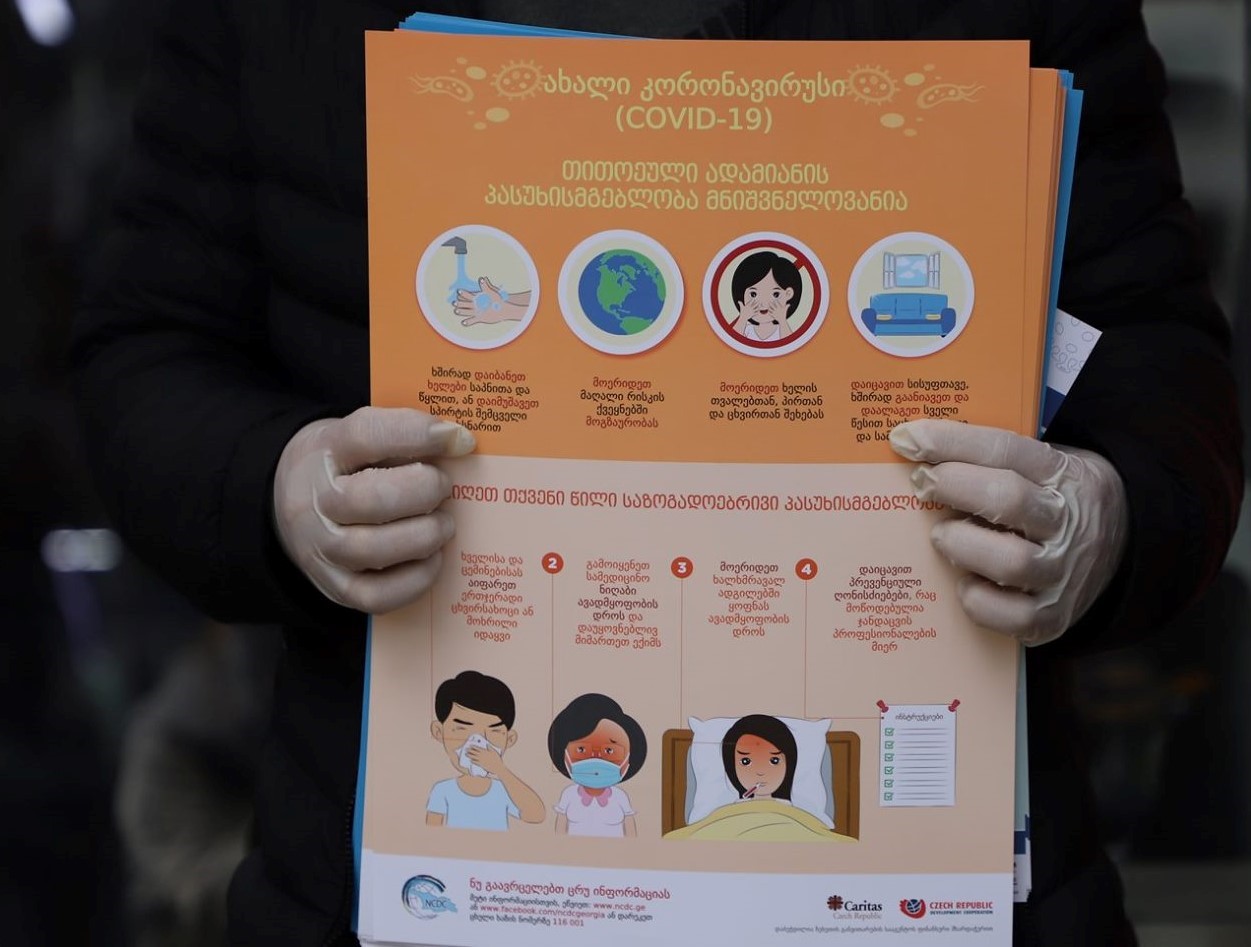


Medical equipment delivered, hundreds of physicians trained, thousands of flyers printed. That's how Caritas Czech Republic (CCR) has aided Georgian authorities, physicians and general population in their battle against Covid-19. By the end of April, the value of such interventions has amounted to 63,000 EUR.
“Just after the outbreak, we started to identify immediate needs and then to tailor our projects to respond them,” says Jan Blinka, head of CCR´s mission in Georgia. The list of such needs has quickly grown from providing accurate information to the population, and training the doctors and journalists to developing new information system for laboratories.
Online training for rural physicians
One of CCR´ most important – and, in equal measure, logistically challenging – tasks was to familiarize all of the country´s 1274 physicians with new State Protocol "Management of suspected cases of Covid-19 in primary healthcare”. The doctors, divided into 66 groups of 15-20 participants, sat through online training sessions.
“Organizing it was very difficult as village doctors in Georgia experience technical problems. Some of them don’t have computers, some don’t have internet connection or simply lack IT literacy. Many of them can be reached only through mobile phones and therefore, using online learning platform have not been an easy task for them,” says Rusudan Chkhubianishvili, CCR Project Manager.
The content of the trainings included infection prevention and control measures, communication with patients, and organizing of remote triage system and reporting system. Follow-up supervision will be provided to the physicians for six weeks till the end of May.
New data system
The development of unified laboratory information system is another intervention, whose benefits will be reaped by the country's entire healthcare sector. The system is designed to facilitate the process of patients' testing registration, the logistics of sample collection, and the tracking of test results. To assure seamless data exchange, the system will be linked to the current NCDC´s laboratory management system. Subsequently, at least 100 staff of laboratories and medical facilities will be trained to use the system.
Awareness raising and thermoscreening campaigns in Zugdidi
To address the needs arising from Covid-19, the CCR team has also tailored its development activities in the Samegrelo-Zemo Svaneti region. The goal is to provide the local population with accurate information about the disease and proper ways of protection and safe behavior, as well as to support local institutions in their thermoscreening efforts.
During the initial stage, the team had 12 000 flyers and 4000 NCDC information posters printed and disseminated in Samegrelo-Upper Svaneti region. Then CCR set out to support thermoscreening conducted by the Zugdidi Public Health Office.
“We are glad to cooperate with the local government and with our joint actions we can contribute to country’s return to normal state as early as possible with less loss to the possible extent. We are ready to resume provision of screening services at our center in Zugdidi and continue to take care of the health of our citizens", says Tamar Kurtanidze, CCRG Projects Manager.” explains Tamar Kurtanidze, CCR Project Manager.
Medical material and equipment for Khulo hospital
The CCR team has also handed out various equipment and materials to a hospital in Khulo in Adjara Autonomous Republic as part of the EU funded project “Promotion of Rural Development and Diversification in Khulo Municipality”. The items in question included medical masks, face shields, medical gloves, medical cap, shoe cover, disinfexol, and a cardiac monitor. The hospital's 70-strong staff members and about 90 daily visitors will benefit from those supplies necessary to prevent further spread of Covid-19.
“This subproject was not originally planned for. It was the ENPARD project’s quick response to the Khulo hospital need to improve its operational capacity and protect its staff and visitors from the virus,” says Giorgi Murvanidze, CCR project manager.
“We could not achieve any of above-mentioned interventions without cooperation with our partners at the Ministry of IDPs, Labour, Health and Social Affairs and without financial support from our donors – Czech Development Agency and EU-funded ENPARD programme,” adds Jan Blinka, CCR´s Head of Mission.


